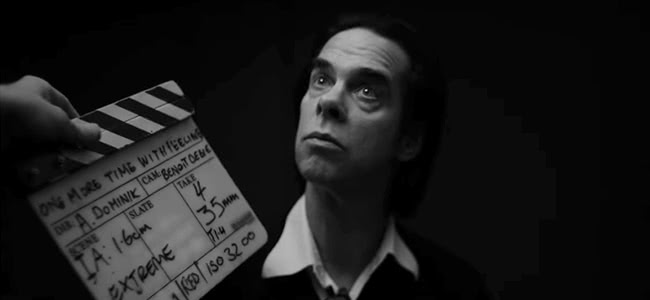One More Time With Feeling is an honest, and at times harrowing, view into the mind of Nick Cave as he struggles through personal tragedy to complete Skeleton Tree, his sixteenth studio album with The Bad Seeds. Premiered worldwide the night before the album’s release, it was the first chance for fans to hear the new music, and provided a special insight into Cave’s state of mind whilst making the album.
Directed by Australian filmmaker Andrew Dominik (Chopper, The Assassination of Jesse James by the Coward Robert Ford), the film was originally intended to be a performance-based concept, but evolved into much more, exploring the tragedy that occurred with the death of Cave’s son, Arthur, in July of 2015. Realising he wouldn’t be able to face the usual media cycle of interviews and appearances, Cave chose instead to reach out to fans through the film. The singer explained to Dominik that he felt he had things that needed to be said, and wanted to let those who cared about his music understand the state of things.
In black and white and 3D, the film is visually stunning, intensely personal yet removed at the same time, the old oversized camera itself becomes a character in the film. It is stark and raw; the fragility of the family is almost awkward to watch, a feeling that this isn’t something the general public should be watching. Cave is the films narrator, at times commenting on the footage in the film, at times reciting poetry, much of it seemingly ad lib.
The premise of the film is centred on the band in studio playing through the tracks from Skeleton Tree; working out parts, remembering chords, changing lyrics, Ellis surrounded by an array of instruments and pedals. The grief filled songs are sparse; Cave’s usual lyrical eloquence is often replaced by raw emotion, the singer’s phrasing deliberately disconnected from the rest of the music.
The most gripping moments in the film aren’t the songs, however, but what happens in between. As expected, Cave is the main focus, speaking in an interview setting with Dominik, the singer struggling to find the words to describe the pain and trauma that he and his family have been through. Cave’s wife Suzie features, as does their son, Arthur’s twin Earl. Warren Ellis is seldom far from the camera, speaking with Cave in studio, himself being interviewed at times, the long-time musical collaborator protective of his friend’s privacy.
The last time we saw Nick Cave on film was in 20,000 Days On Earth, a heavily stylised and staged look at ‘a day in the life’ of the singer. It succeeded in perpetuating the icon and legend that is the artist we know as Nick Cave. By contrast, One More Time With Feeling entirely humanises the singer, depicting him as the family man, the loving husband and father, the friend, a normal guy doing his best to deal with such a life changing tragedy, whilst still trying to endure daily life.
Surprisingly there is a humour throughout the film, often we find Cave being refreshingly funny. He comments on his wife’s habit of constantly moving furniture, joking that she rearranges their house whilst he sleeps. “How is my hair looking?” the singer facetiously asks Ellis, whose usual response is “better than ever.” The in studio banter showing a band that have been together for many years, the intimate humour present despite the presence of the cameras. An early exchange between Ellis and Cave regarding a new violin is wonderful.
Towards the films end, whilst being interviewed in his Brighton home, Cave talks about the elasticity of time, and how he and his family are always being drawn back to the events surrounding his son’s death, an event that seems to exist in a bubble. The normally eloquent singer struggles to find the words to describe the complicated emotions, as he explains “I can turn it into a platitude – a pretty greeting card platitude – that he lives in my heart, but he doesn’t. He’s in my heart, but he doesn’t live at all.”
The film ends with face forward shots of everyone involved in the making of the film, the family appearing last, before cutting to footage of the cliff where Arthur fell. The song we hear as the credits roll is a recording that Cave and his sons did of ‘Deep Water’ by Marianne Faithful, Arthur and Earl singing the film to a close, together one last time.

































